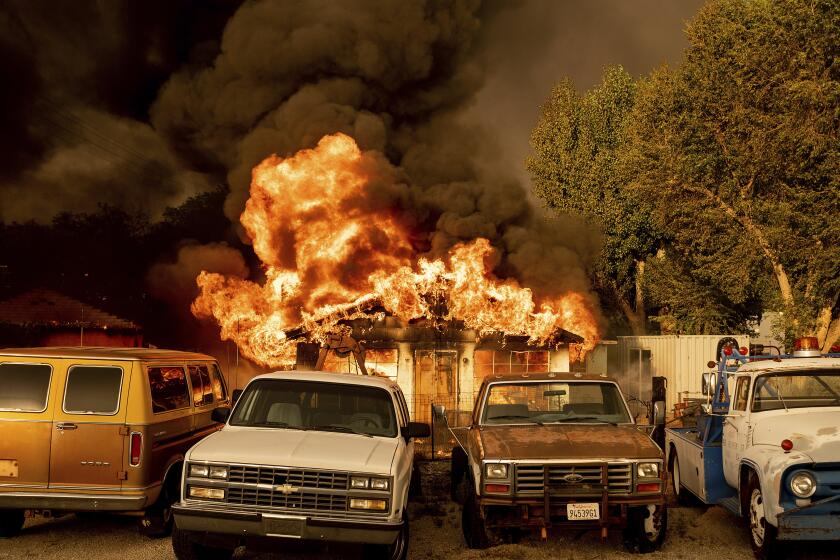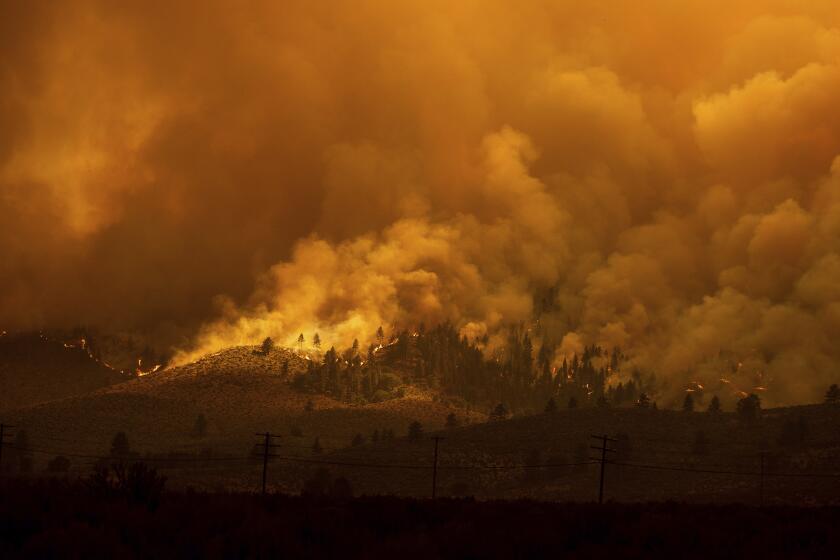Fleeing high rents, he found a tiny town for his Burning Man dreams. Then came wildfire
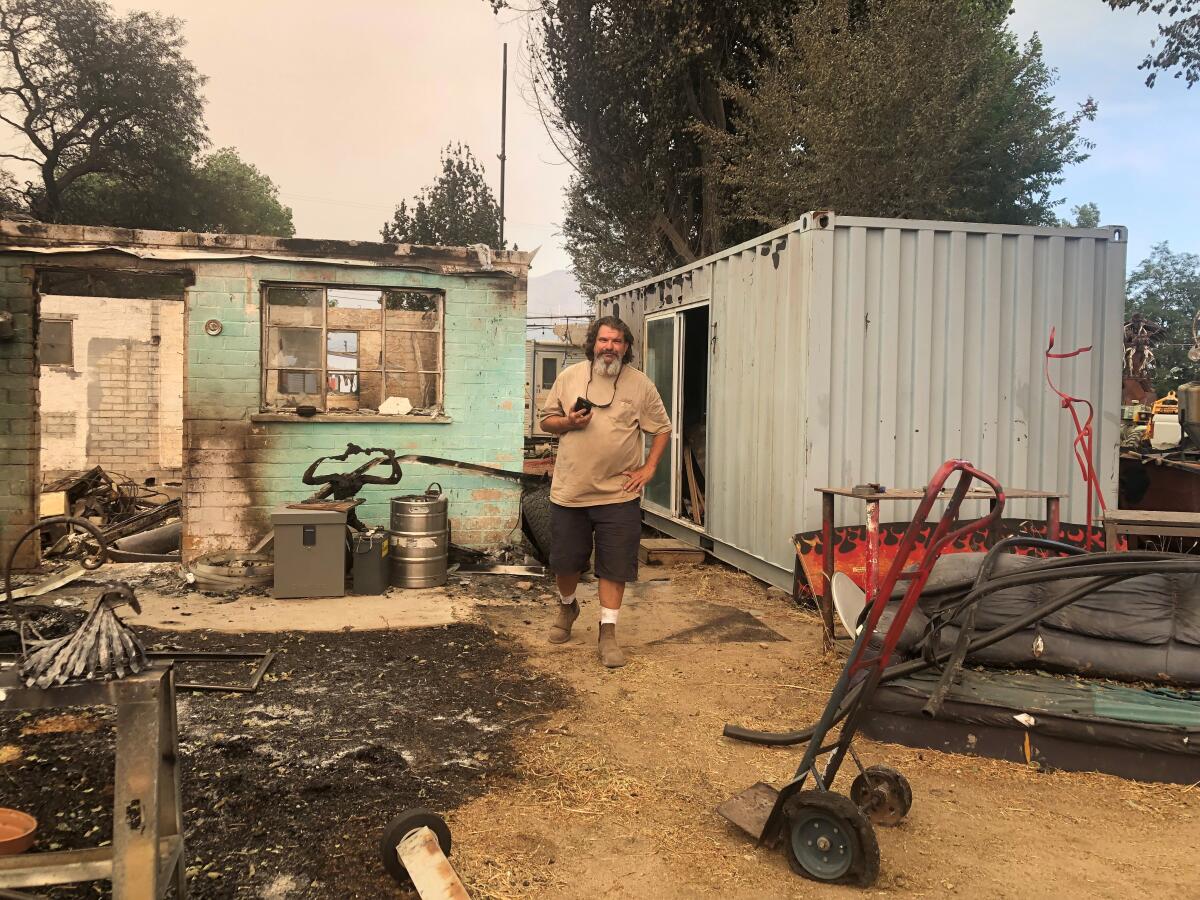
DOYLE, Calif. — Mike Snook had a vision for this rough and faded California town on the Nevada border: It would be a refuge for the free spirits of Burning Man, those priced out of the Bay Area and looking for a place to build really big art.
In 2019, he began buying run-down property for cheap — his first purchase was $30,000 — while slowly loading it up with tools, supplies and random stuff. Think an entire shipment of Chinese teak doors, a 1946 UPS truck, a Zamboni ice cleaner.
Saturday night, much of that dream went up in smoke when the Beckwourth Complex fire roared through Doyle, burning 33 houses, including multiple homes owned by Snook — as just about everyone here calls him.
“Five houses down, one left,” Snook said, with a forced laugh, sitting in the midday darkness of the Buck Inn, Doyle’s only bar. “I thought, ‘There’s no way it’s going to hit all of them.’”
Ignited by lightning that struck bone-dry tinder in the Plumas National Forest, the Beckwourth Complex remains California’s largest wildfire this year, having grown to more than 95,000 acres in less than two weeks. Although now 70% contained, this blaze could be a harbinger of bigger ones in coming months, especially if California endures more intense heat waves, like the recent one that pushed temperatures to triple digits.
Some 45 miles northwest of Reno in Lassen County, Doyle is an unincorporated town of nearly 700 people that once was anchored by a row of historical buildings made from long white bricks manufactured nearby. On Tuesday, several of those buildings still smoldered. One of them was Snook’s main house, an old cafe called the Modern with sea-foam green walls.
There was little left to salvage — a makeshift goldfish pond had somehow survived with its lilies unscathed, a blackened sculpture of a torso guarded what was once the front door. The rest of his possessions were diminished to ash and trash.
But Snook was more anxious about what he couldn’t see: the condition of his 12-acre ranch less than a mile away, where about 50 shipping containers held the bulk of his ambitions. It was behind the evacuation line, and he couldn’t get in to check.
In 2004, he founded an arts incubator and workspace in a warehouse in east Oakland he named NIMBY as a tongue-in-cheek jab at all the places that had been less than welcoming when “big, around-the-clock” projects, many for Burning Man, started going up too close to keep neighbors comfortable.
When marijuana became legal, Oakland rents skyrocketed as warehouse space became a hot commodity for growers. His went from $28,000 a month to $175,000, he said. He gave up searching for a new space in the Bay Area, priced out.
“We looked and looked and looked,” he said. “We finally just came up here.”
Snook bought the cafe “in a panic.” A friend who owned property near Doyle had recently purchased the Buck Inn to keep it from closing down — it’s the only bar for miles around, and his friend didn’t want to “drive 60 miles for a drink,” he said.
The Sugar fire has burned homes north of Lake Tahoe. Meanwhile the River fire balloons in size south of Yosemite National Park.
Others in his artistic circle followed, including Cowboy Girl, who was consoling Snook at the bar in self-made black platform boots, short shorts and a felt hat with a feather. Her father, Michael “Flash” Hopkins, is a Burning Man legend and one of its earliest participants, sometimes credited as a founder.
Snook bears more than a passing resemblance, in temperament and looks, to the Dude, the louche character portrayed by Jeff Bridges in “The Big Lebowski.” His floppy hair swoops back off his forehead with the same dip and curl, his eyes have the same savvy directness.
Despite being squarely in the center of a tragedy, he seemed amiable and calm while eating a bowl of tri-tip and broccoli.
But he was “crying inside,” said his friend Steven — another Oakland refugee, who was once a dancer in a punk rock drumline — from behind the bar where he was serving drinks. Steven, like Cowboy Girl, asked not to be fully identified.
When Snook heard the fire was coming, he and his friends loaded up trucks in case they had to evacuate, packing the special belongings they didn’t want to lose, including the till from the bar and guns. Cowboy Girl is a sharpshooter who grew up pinging cans off her father’s head with a .22 and now has her own circus show, she said.
They were sitting in the Buck Inn when one of those trucks, a late model Chevy Cheyenne, was stolen. Snook said he was certain he knew who did it — a local with a long criminal record who had been “acting strange” in the bar moments before.
Snook and the Buck’s crew took off in search of their suspect, he and others said.
“I went after him, but he got to the desert,” said Angelee Stevenson, a friend of Snook’s who lived off the grid for 25 years, and knows its back roads are treacherous.
Stevenson wasn’t spared by the fire either. Though she can’t claim a permanent address or many possessions, she said, she had been staying around Snook’s buildings.
“All I really lost was my breathing machine,” she said, referring to her continuous positive airway pressure apparatus, as she rolled a joint from a plastic container filled with marijuana shake that sat on the bar.
She tried to convince the doctor to give her another machine, she said, but it required a trip to Reno, and Stevenson said she had to finish making tie-dye dresses and shirts first. Those she hoped to sell during the upcoming Doyle Days festival, when townspeople catch and race blue-bellied lizards and hold a pancake breakfast fundraiser for the fire department — the biggest local event of the year.
By the time Snook found the truck, stuck out in the scrublands, it had been abandoned. They were towing it back to the road when they saw the fire “going wild,” he said.
“We knew something just went crazy,” he said. Police blocked them from returning, leaving Snook with nothing but the T-shirt and shorts he was wearing, and his pit bull, Tank, who’d come along for the pursuit.
Doyle lies mostly in the flatlands at the edge of the Plumas forest, where the rugged mountains abruptly transition to sand and sagebrush. Ranches fill its western side, winding into the hills and down to the narrow band of Highway 395 that cuts through the town, leaving the Buck Inn and a cluster of houses and businesses on the east side.
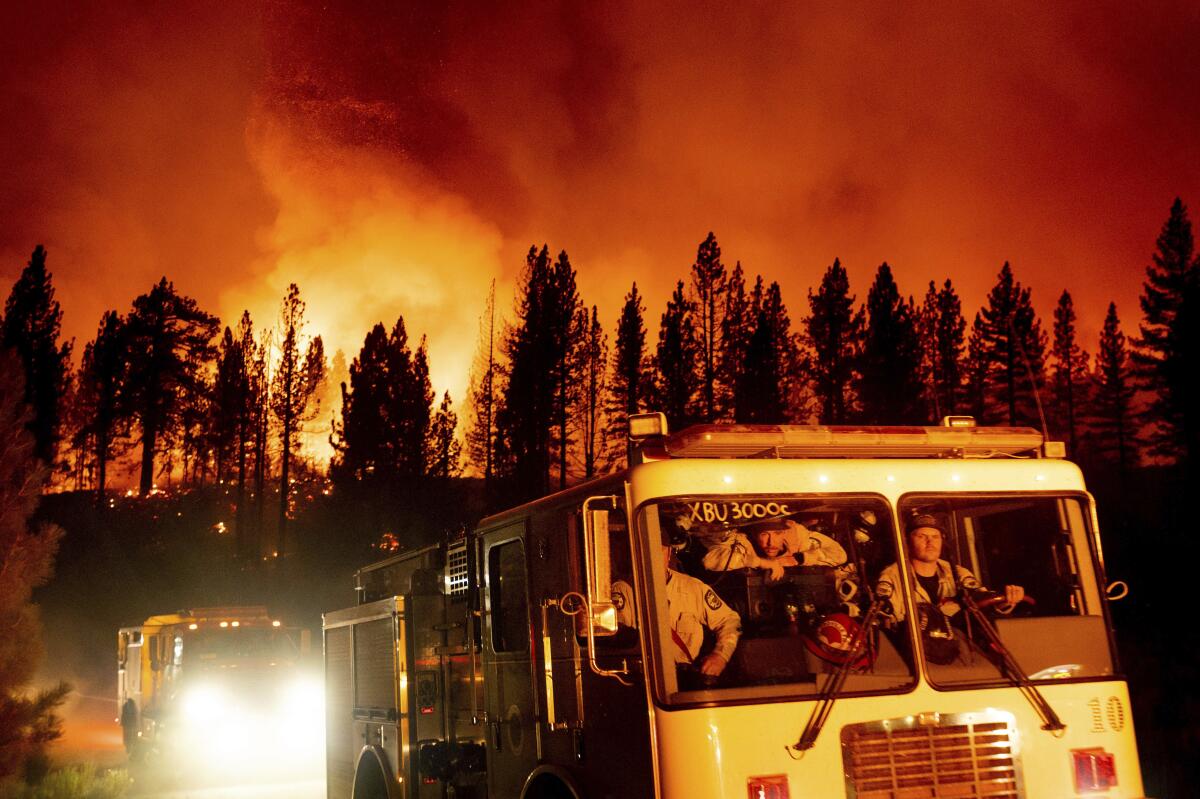
For days, the Beckwourth Complex had been creeping through the dense pines on the far side of the ridge, said Doyle’s volunteer fire chief, Kathy Catron. Though federal fire officials had warned it could move toward Doyle, when it happened on Saturday, even firefighters were surprised by its speed and ferocity.
Wind-blown flames ignited on the peaks above Doyle, shooting down the hillside and over a bulldozed firebreak that had been dug earlier. The main thoroughfare into the mountains, Doyle Grade, acted like a fire chute with its canyon-like sides. The force of the whipping gusts, pelting sand and flames broke windows on fire vehicles and “doors ripped out of crews hands” as they tried to get inside, said Scott Packwood, the Lassen Modoc Cal Fire chief.
“You weren’t going to put that fire out,” he said.
When the fire came to the end of Doyle Grade, it jumped straight over the highway, nearly behind the Buck Inn “like a kid stepping over a crack in the sidewalk,” said volunteer firefighter Mike Castle.
Built from an old chicken coop, the weathered Buck Inn is made of two-by-fours with a wooden porch leading to unwelcoming windowless doors and a sign hanging nearby offering to trade ammo for pizza or ice.
Ammo, said one regular, has been in short supply since looters hit the town after another devastating fire last November that destroyed 16 occupied structures, lit by a careless resident burning trash.
Inside, the Buck Inn is classic dive bar: Christmas tree lights, eight-point deer heads, ads promoting pickled eggs at 2 for $3 and a steady stream of people who know each other’s business.
The dryness of the vegetation, primed by both long-term drought and shorter-term heat waves, is making it easy for fires to ignite and even easier for them to spread.
The bar survived both recent fires, but Rick Wilson, who lived next to one of Snook’s buildings, said he knew this time “it was going to be a matter of moments before there are embers on my house.”
Wilson, a former teacher and coach at Henry E. Huntington Middle School in San Marino, began pulling possessions out as quickly as he could, but the wind had already carried burning bits across the street.
Doyle has no public water or sewers, meaning there are no fire hydrants. Firefighters rely on water tanks, but when electricity goes down, the local wells can’t pump. Catron, the fire chief, knew she didn’t have enough water to fight the blaze, and says other crews on the scene told her to save what she had.
Catron, whose great-grandfather founded Doyle, says the suggestion made her furious.
“There is a lot of emotion because it’s your home,” Catron said. “This could have taken everything from everybody.”
Late Tuesday afternoon, Snook made it to the ranch. The fire had burned through, but not all was lost. Some of the shipping containers were destroyed, nothing left but strips of metal hanging from rectangular frames.
The Chinese doors were no more; the Zamboni was fine.
Snook wandered around dazed, tripping over a downed power line that was, luckily, dead. A swarm of fire chaser beetles had overrun the site, seeking freshly burned wood to lay their eggs and viciously biting with a force that felt like a hornet’s sting.
“Oh, God,” he said, running a hand through his hair. “How the hell does the Zamboni survive? I hate that thing.”
At the edge of the property, between the hills and the lost containers where fire most certainly rushed through, an unlikely sight drew his attention: Biscuit and Gravy, his two pigs, were alive. Gravy squeaked with unmistakable joy at the sight of humans.
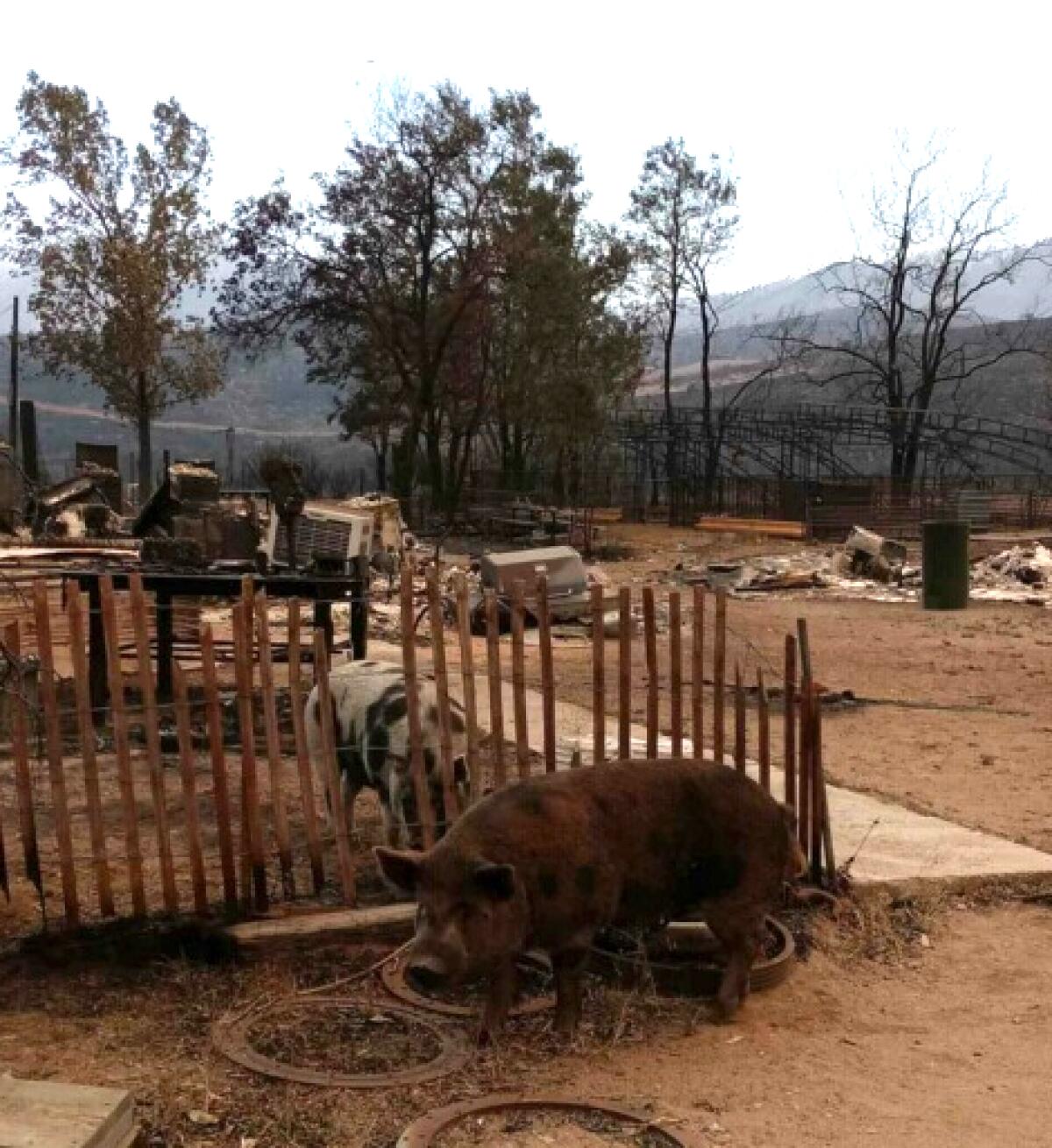
He let them out of their pen, and they began to root for food that wasn’t to be found.
Snook is unsure if he will be able to rebuild — like many here, he couldn’t obtain fire insurance because there is no city water, and most insurers deem it too high-risk. But there’s something about Doyle that still feels worth working on, he said. He’s hoping Doyle Days will still happen. He wants to get back to building community in this new home.
In Gerlach, Nev., near where Burning Man is held, “you walk down the street and they hate you,” he said.
“Here, they like you, they give you banana bread, eggs,” he added. “Most of the people here are really great.”
More to Read
Sign up for Essential California
The most important California stories and recommendations in your inbox every morning.
You may occasionally receive promotional content from the Los Angeles Times.
